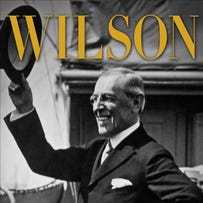Stalin and Shostakovich
The most sinister moment of Larry Weinstein’s Shostakovich Against Stalin, a documentary made in the 90s, is the footage of a great victory march in front of Stalin watching from the walls of the Kremlin – the floats, the young athletes, the ecstatic personality cult – while we hear the sarcastic tones of the Eighth Symphony. As one of the composer’s friends says, the music captures the devilishness, the Satan’s feast quality, of the Stalin dictatorship.
Or another moment in this fine documentary when a woman tells of the premiere of the Fifth in 1936. The audience was one where everyone would have had a family member in gaol or exile. They stood applauding for half an hour. In his music they heard the oppression they lived under, the tragedy of their lives. Even the Seventh Symphony – about Leningrad’s resistance and played as an epic symbol – was not only about Hitler but about Stalin as well. The Eighth got him into trouble because its tragic dimensions – produced at a time of Soviet victory – contradicted Soviet triumph. It was unanswerably about totalitarianism.
A young Australian musician presently conducting in Petersburg told Helena and me that when he tells a taxi driver in that city that he is a conductor they refuse to charge him. Though they might ask for a ticket(and sometimes attend). He said, “Russia is the only place in the world where music is religion.” Conversation with him on Friday got us into this renewed Russian frenzy – and the fact we are headed to Petersburg soon. Where I intend to do what I like most, next to running on soft sand or reading in a silent house : walking through history.
One site I will pay homage to is the flat of Anna Akhmatova in the former palace of the Sheremetev. Read about her in the chapter “Russia Through the Soviet Lens” in Orlando Fige’s Natasha’s Dance, a history of Russian culture.
In the Yezhov terror she spent 17 months in the prison lines of Leningrad delivering a letter or a parcel for her son who had been taken off for reciting Mandelstam’s seditious poem about Stalin ( “His cockroach whiskers leer and his boots gleam”) to a group of student friends, one of whom was an NKVD informer. Once in line she was recognized as the famous poet and a woman with bluish lips whispered, “Can you describe this?” She answered that she could.
Then something like a smile passed over what had
once been her face.Akhmatova had chosen to stay in Russia and live its horrors. She died in 1966, her funeral attended by thousands.
She had rarely missed a Shostakovich premiere and dedicated the Soviet edition of her poems to “Dimitry Dmitrievich Shostakovich in whose epoch I lived on earth”.
Read about her with one of her symphonies playing.
Stalin, “the murderer and peasant-slayer”, followed both their lives with malign interest.
Comments are closed.

Re post Stalin&Shostakovich thanks for this.I enjoyed the reference to Mandelstam’s “Epigram against Stalin” I read it first in NYR and I often re-read it and think about it ( it has awakened me to read whatever the local library has on Russian History) an unnamed critic described it as ‘the sixteen lines of a death sentence’ and ‘the 20th century’s most important political poem written by one of its greatest poets against the man who may well have been the cruelest of tyrants’. I do so appreciate your posts and thank you sincerely
Esme Banks.
Yes, that’s where I read it too. I think last year. I’ve been tracking down his wife’s memoir without success. What wonderful, suffering people they were. And what nightmares they were forced to live, with Stalin following their every move.
Some critics have stated that, Hope Against Hope and the sequel Hope Abandoned are two of the best books ever written? They can be picked up quite cheaply for $8 at secondhand book shops. I have read them a few time, and they are very good, but to say they are the best is taking it a bit far! Gleebooks has a Everyman’s book on Russian Poets. This small wonderful book has a great collection of Russian poetry.
Will head there tomorrow. Thanks.
I get a feeling of deep tragedy when I hear about Stalin, et al. I spent my early childhood in Eastern Europe under Stalin. I remember when my uncle was dragged away in the middle of the night, the night before Christmas Eve in about 1951. We never knew why. You did not need a reason. i also remember the euphoria when Stalin died and many political prisoners, including my uncle were let out.
There is a beautiful book by William Vollman, Europe Central, about Stalin, Hitler and the madness they perpetrated. That’s where I heard about Akhmatova.
Yes, I agree. That knock on the door in the middle of the night…and some people try to tell us there’s s moral equivalence between those societies and our own flawed democracies. We must honor those fine people who resisted and revile the tyrant. Thanks for the recommendation. I haven’t read it but will.
What pleasure to know that Shostakovich prevailed. Recommend Daniel Shafran’s rendition of his 2nd Cello Concerto. It was written during Khrushchev’s destalinisation period and premiered as part of Shostakovich’s 60th birthday celebrations in September 1966.